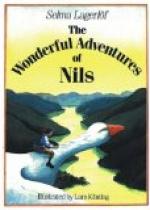The little loon wasn’t able to stay under water any longer, but appeared on the water’s edge, little and black and venomous. The swans rushed toward him; but when they saw what a poor little thing it was, they turned abruptly—as if they considered themselves too good to quarrel with him. Then the little loon dived again, and pinched their feet. It certainly must have hurt; and the worst of it was, that they could not maintain their dignity. At once they took a decided stand. They began to beat the air with their wings so that it thundered; came forward a bit—as though they were running on the water—got wind under their wings, and raised themselves.
When the swans were gone they were greatly missed; and those who had lately been amused by the little loon’s antics scolded him for his thoughtlessness.
The boy walked toward land again. There he stationed himself to see how the pool-snipe played. They resembled small storks; like these, they had little bodies, long legs and necks, and light, swaying movements; only they were not gray, but brown. They stood in a long row on the shore where it was washed by waves. As soon as a wave rolled in, the whole row ran backward; as soon as it receded, they followed it. And they kept this up for hours.
The showiest of all the birds were the burrow-ducks. They were undoubtedly related to the ordinary ducks; for, like these, they too had a thick-set body, broad bill, and webbed feet; but they were much more elaborately gotten up. The feather dress, itself, was white; around their necks they wore a broad gold band; the wing-mirror shone in green, red, and black; and the wing-edges were black, and the head was dark green and shimmered like satin.
As soon as any of these appeared on the shore, the others said: “Now, just look at those things! They know how to tog themselves out.” “If they were not so conspicuous, they wouldn’t have to dig their nests in the earth, but could lay above ground, like anyone else,” said a brown mallard-duck. “They may try as much as they please, still they’ll never get anywhere with such noses,” said a gray goose. And this was actually true. The burrow-ducks had a big knob on the base of the bill, which spoiled their appearance.
Close to the shore, sea-gulls and sea-swallows moved forward on the water and fished. “What kind of fish are you catching?” asked a wild goose. “It’s a stickleback. It’s Oeland stickleback. It’s the best stickleback in the world,” said a gull. “Won’t you taste of it?” And he flew up to the goose, with his mouth full of the little fishes, and wanted to give her some. “Ugh! Do you think that I eat such filth?” said the wild goose.
The next morning it was just as cloudy. The wild geese walked about on the meadow and fed; but the boy had gone to the seashore to gather mussels. There were plenty of them; and when he thought that the next day, perhaps, they would be in some place where they couldn’t get any food at all, he concluded that he would try to make himself a little bag, which he could fill with mussels. He found an old sedge on the meadow, which was strong and tough; and out of this he began to braid a knapsack. He worked at this for several hours, but he was well satisfied with it when it was finished.




